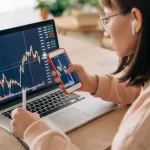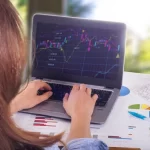Forex, or foreign exchange trading, has seen remarkable evolution over the years. From being an exclusive activity for central banks and multinational corporations to becoming accessible to individual traders globally, the forex market has come a long way. Let’s delve into the past, understand the present, and forecast the future of forex trading from an expert perspective.
The Evolution of Forex Trading: A Historical Perspective
In the past, forex trading was a complex and esoteric field, confined to central banks and multinational corporations. The Bretton Woods accord in 1944 set the tone for modern forex trading by pegging major currencies to the US dollar. In the 1970s, forex started to expand beyond the realm of governments and big businesses when floating exchange rates were introduced. The 1990s saw a significant expansion in forex trading due to the advent of technology and online platforms. Individual traders could now participate directly in forex trading, marking a significant democratization of the market. The 2000s brought about further evolution with algorithmic trading and high-frequency trading, leading to increased market efficiency and liquidity.
Modern Forex Trading: Harnessing Technology
The face of modern forex trading has been significantly shaped by technological advancements. With the advent of the internet, online trading platforms and apps have made forex trading accessible to anyone with an internet connection. Mobile trading has further increased accessibility, enabling traders to monitor and execute trades from anywhere, anytime. Algorithmic trading has allowed for more efficient and precise trading, eliminating the potential for human error. High-frequency trading has contributed to increased market liquidity and tighter spreads, enabling traders to capitalize on minute price fluctuations. In recent years, AI and machine learning have started to play a significant role in forex trading, offering predictive analytics and automated trading solutions.

Current Trends Shaping the Future of Forex Trading
There are several noticeable trends shaping the future of forex trading. First, AI and machine learning are predicted to play an increasingly significant role in forex trading. Traders can leverage these technologies to predict market trends, automate trading, and manage risk better. Second, the rise of cryptocurrencies as tradable assets is likely to influence forex trading. The volatility of cryptocurrencies offers potential for significant profits (and losses), attracting many forex traders. Third, regulatory changes could significantly impact forex trading. As the market continues to evolve, regulators worldwide are working to ensure fair and transparent trading practices, which could lead to stricter rules and regulations.
Expert Predictions: What the Future Holds for Forex
Experts predict several developments in the future of forex trading. Firstly, the use of AI and machine learning in forex trading is expected to increase, leading to more sophisticated trading strategies. Second, the integration of blockchain technology could lead to faster and more secure transactions. Third, the rise of cryptocurrencies as tradable assets could potentially reshape the forex market structure. Fourth, experts anticipate stricter regulatory oversight to ensure fair and transparent trading practices. Finally, the role of big data in forex trading cannot be understated. The ability to analyze and interpret massive volumes of data can provide traders with valuable insights into market trends and patterns.
The Impact of Global Events on the Future of Forex
Global events have always played a significant role in shaping forex trading, and this is likely to continue in the future. Events like Brexit, the US-China trade war, and the COVID-19 pandemic significantly impacted forex markets, influencing currency values and volatility. Furthermore, geopolitical risks, such as conflicts and political instabilities, can cause dramatic shifts in forex markets. On the economic front, central bank policies, interest rates, inflation rates, and economic growth rates are key factors influencing forex markets. Moving forward, environmental, social, and governance (ESG) factors are also expected to play a growing role in forex trading decisions.

Preparing for the Future: Strategies for Forex Traders
To be prepared for the future, forex traders need to adapt and evolve. Embracing technology is crucial, including the use of AI, machine learning, and big data analytics. Keeping abreast with regulatory changes is also essential to ensure compliance and avoid potential fines and penalties. Traders should also diversify their portfolios by incorporating a variety of assets, including cryptocurrencies. Staying informed about global events and understanding their potential impact on forex markets is another critical factor. Finally, implementing risk management strategies is essential to protect against potential losses due to market volatility.
As we move towards the future, the landscape of forex trading is bound to change. However, the basic principles of successful forex trading – discipline, knowledge, and a solid strategy – will always remain the same. By staying informed and adaptable, forex traders can navigate the ever-changing market and capitalize on its opportunities. The future of forex trading looks promising, filled with technological advancements and increased market access. However, it is also likely to bring new challenges and uncertainties, making it more important than ever for traders to stay informed, adaptable, and resilient.





